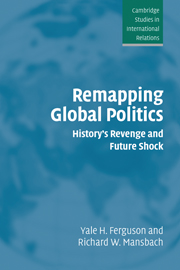Book contents
- Frontmatter
- Contents
- Preface
- Acknowledgments
- 1 Postinternational politics
- 2 Theory and method
- 3 Political space and time
- 4 States and other polities
- 5 Identities in a postinternational world
- 6 A postinternational world economy
- 7 War in a postinternational world
- 8 Technology and change
- 9 The future
- Index
- CAMBRIDGE STUDIES IN INTERNATIONAL RELATIONS
1 - Postinternational politics
Published online by Cambridge University Press: 22 September 2009
- Frontmatter
- Contents
- Preface
- Acknowledgments
- 1 Postinternational politics
- 2 Theory and method
- 3 Political space and time
- 4 States and other polities
- 5 Identities in a postinternational world
- 6 A postinternational world economy
- 7 War in a postinternational world
- 8 Technology and change
- 9 The future
- Index
- CAMBRIDGE STUDIES IN INTERNATIONAL RELATIONS
Summary
Remapping “political space” is the “new frontier” of global political theory. Like the title voice-over of the television series Star Trek, both the task of remapping and the shifting nature of contemporary global politics challenge us to go boldly where no one has gone before. The task of remapping is a critical one, precisely because the “Westphalian moment” is passing. Moreover, it is increasingly obvious that that moment only very gradually and never fully “arrived” and, to the extent that it did, may well have been a historical anomaly. The end of the Cold War, present-day globalizing trends, the undermining of some of the state's familiar roles, the proliferation of nonstate actors, fears of apocalyptic terrorism, and a host of other developments make much of existing international relations (IR) theory seem hopelessly obsolete. It not only fails to illuminate but also actually obfuscates the main features of present-day global politics. In sum, most of traditional IR theory is bad theory.
Even those like ourselves who have abandoned traditional approaches are keenly aware of how rapidly things are moving and how little we really know. We sense the startling new-ness of the current world as well as how much it resembles the past, not only the European epoch of the Westphalian State but also the vast stretches of human history going back to much earlier political forms.
- Type
- Chapter
- Information
- Remapping Global PoliticsHistory's Revenge and Future Shock, pp. 1 - 34Publisher: Cambridge University PressPrint publication year: 2004
- 1
- Cited by

